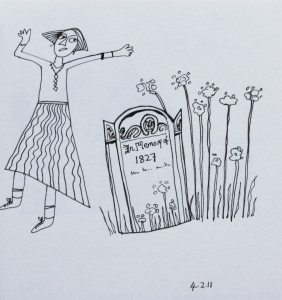Published in Spelk Fiction August 2015
She’s up there again. I don’t know how she does it. Ma and Pa never see her. They’re always too busy with their card games. My brother sees. He’s always asking when it will be his turn and I then have to say, ‘Don’t be silly, Jose. She’s the only one who can fly.’
When I say this tonight his face crumples like a sweet wrapper and I have to add, ‘Well, maybe Jose. Maybe one day.’
‘Do you think flying is easy?’ he asks, his face all hopeful and wide. ‘Pa says learning to drive is as easy as ABC. ‘
I want to say to Jose that he’s not so good with his ABC, not yet anyhow, but I don’t.
‘What does she do up there?’
I tell him how she looks down on the patchwork of yards, on us lying here on the terrace next to Ma and Pa, at the silver snake of the river and that when she flies up high she sees the whole earth, a blue marble in space.
‘Wow,’ he says. ‘Wow.’
‘Hello up there! Are you having fun?’ I say though not so loud that Ma and Pa will notice. But even if I shouted, the flying girl wouldn’t answer. She’s too far away.
My brother is wearing blue socks. The flying girl has three pigtails and her dress sails behind her, white like the moon.
‘Is she going to fall?’ my brother asks.
‘Of course not,’ I say. But she does look a little lost all alone up there.
‘Why are her arms stretched out?’ he says, pulling at my hem.
‘To help her navigate.’
‘Like a bird’s wing.’
‘Yes something like that.’ I push my brother’s hand away and when I look up again the flying girl is turning toward the bridge. The lights on the bridge are like the stars in the sky. ‘I wonder if she’ll fly over the top or go underneath.’
‘She’ll go under like those aeroplanes we saw last summer.’ My brother nods his head slowly when he says this.
‘Maybe,’ I say.
The thud on the pavement is soft. As if someone had thrown a cushion. I close my eyes. ‘Is she still flying?’
‘She went under the bridge,’ my brother says, ‘like I thought she would.’
Everyone remembers the day the famous flying girl, Emilia Gomez, visited our city. Who could forget, even though it is so long ago? No one knows what happened to her. Some say she flew to the moon. Others say she was captured by scientists who wanted to study her unique abilities. My brother said she dived into the river and turned into a fish. There were plenty of rumours. A Hollywood film too. But the truth is, none of us really knows. I think she decided to stop flying. She grew up and she got scared. But when I close my eyes at night I still see her, flying above us all.
WoW CreativeWritingMatters Short Story Competition 2015 – long-listed
There was a moth on her doorstep, its wings a fan of brown and cream.
‘Why do you need to work?’ her mother snapped as she stepped out of the apartment. ‘Do you really think you’ve become an Amerikan?’
Shirin considered her mother’s words as she walked. Deep shadows cut across the street. Cab horns blared and the man at the Greek store on the corner smiled. The sky overhead floated blissful and blue. What did it mean to be an American anyway?
‘You’ll be wearing the stars and stripes next,’ her mother had said. Wasn’t thirty years enough to become part of this country?
At the intersection someone shouted, ‘Careful where you’re going!’ and Shirin jumped, remembering her dream of buildings crashing into dust and the silence after, while the moth fell through the night onto their doorstep, its wings crushed and broken.
She looked at her watch. How had she managed to run so late? She hurried, and her heels clacked on the side-walk and her breath came out in little bursts like gunshot.
In the dream she had seen a face at the window but it was no one she knew and when she looked again the face had gone and she was not certain if she had seen it at all. Later she dreamed she was in a library. Flames were eating at the books. She tried to reach out and save them, but the man burning the books was full of hate because of the fallen buildings and the people caught inside.
A young man whistled in the street. She had the impression that he was whistling at her. She walked a little faster.
The day she started this job her mother said, ‘Don’t be fooled by their friendliness. It’s only a mask.’
Shirin shouted back, ‘You always see the worst in people! That’s your problem.’
Her mother sighed, shrugged and turned her back. Shirin stood in the tiny kitchen, her hand gripping the edge of the counter. She watched her mother at the sink, washing up in the long shapeless clothes she wore and then she went to the bathroom, splashed her face in cold water, re-applied her lipstick and walked out without saying goodbye.
The man whistled again. A blonde in a tight skirt hollered a reply. Maybe, Shirin thought, maybe I’ll never be fully part of this country. But perhaps I no longer belong anywhere.
The first thing she saw were the people looking up at the blue sky and she heard shouting but the words did not mean anything. Then a crowd of people was running in her direction. A gust of leaves flew up with the crowd. No. Not leaves. Fragments of grey paper, and ash too, clouds of it blotting out the sun and there was a smell of something and she began to run with the people because the dust was in her eyes and mouth; because people were screaming that the building was hit.
She ran home with the panic and the crowds. A man in a suit, his eyelashes grey with the dust, asked if she was all right. There were tears in his eyes.
‘What’s happened?’
‘Didn’t you see?’
‘No.’
The man shook his head and moved away and she was swept on, grateful.
When she reached the apartment she did not use the key. She rang the bell. Her mother threw her hands in the air. ‘Why is there dust in your eyes? Why are you home so soon?’
Shirin could not speak. Her mother fetched a cold flannel and gently cleaned her face.
They went back to the old country; she and her mother. It was not as Shirin remembered it.
‘You can’t wear those clothes in the street,’ her mother said.
‘There’s nothing wrong with these.’ Shirin smoothed down her skirt and adjusted her hair in the mirror.
‘If you show your legs like that, they’ll kill you.’
‘I’ll do what I want.’
‘Don’t be a fool,’ her mother said. ‘This isn’t Amerika.’
Shirin walked to the door but her mother blocked her path. ‘Please daughter.’ She tore the scarf from her head. ‘At least wear this.’
Shirin took the scarf, blue as the sky, but she saw the grey in her mother’s hair, grey like ash. And she threw the scarf round her neck, where it trailed like a river. ‘Now let me go.’
‘Why must you be so stubborn?’ her mother asked, beginning to weep. ‘Your father would never have allowed this.’
‘He’s not here.’
Her mother fell to her knees. ‘I beg you.’
‘You live in the past. Now let me go.’
Click, clack down the street in her heels: click-clack to the sound of car horns and the smell of fumes. Click-clack past the new high rise buildings and backdrop of mountains, lost in the smog.
As Shirin walked, the car horns in the city streets receded. She walked and was lost in her American life, lost in Richard and his promises, remembering the slight pause when she first met his parents, the politeness that followed. She walked and gazed at the ring on her finger, the tiny diamonds glittering in the heat of the street. She walked and did not notice how everything had changed: the sea of black clothes, the head coverings; the sense of something lost.
A man yelled at her. ‘Go home.’
She opened her mouth but only dust came out.
‘Where is your veil?’
She looked. The man had stones in his eyes.
Casting the shoes aside, she ran. Stars tumbled out of the sky onto a flag. A group of men chanted and burnt the flag and the stars flew back up to where they had come from.
She grabbed at the ash that fell and pulled it over her head.
On the corner by the apartment a man was burning books. ‘Murderer!’ she cried. The word bounced off the rubble, came back again.
The men came running.
‘It’s me, Shirin. Let me in!’ The buzzer pierced her ears.
The door opened. The men became shadows and ash.
Her mother hugged her tight. ‘We do not belong here any more, Shirin. Perhaps we have indeed become Amerikan.’

